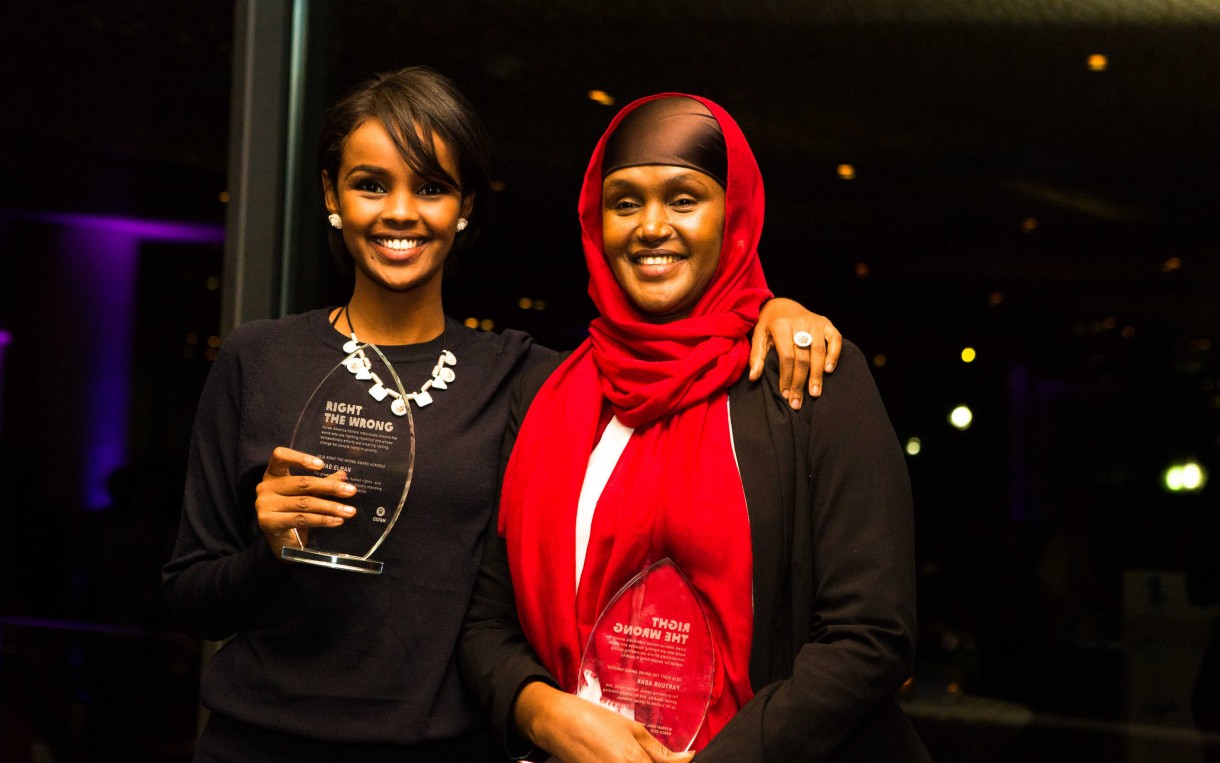“I fear for my mother every day”
 Ilwad Elman and her mother, Fartuun Adan, accept an Oxfam Right the Wrong award. “We believe everyone’s life is important,” says Adan. Photo Credit: Keith Lane/ Oxfam America
Ilwad Elman and her mother, Fartuun Adan, accept an Oxfam Right the Wrong award. “We believe everyone’s life is important,” says Adan. Photo Credit: Keith Lane/ Oxfam America
On International Women’s Day, we honored three women whose commitment to peace and justice is unwavering, even in the face of violence.
As I headed for Oxfam’s International Women’s Day celebration on Monday, I thought, “prepare to be amazed.”
It was good advice. The organizers had pulled together about 80 activist women from across the country and around the world—including many of Oxfam’s Sisters on the Planet ambassadors—and the stories I heard about women responding to humanitarian emergencies were riveting.
I sat down with Majd Chourbaji, a Syrian mother who took part in the demonstrations of the Arab Spring, and whose life was shattered by the violence that followed. Now, she works with refugees in Lebanon, where families that fled the war live in limbo—stuck in tents or overcrowded apartments, where children lack schools, parents lack incomes, and newborn babies belong to no country. Through her organization Basamat for Development, she is helping women get training, jobs, and psychological support. And she has started a school that serves 1,000 children—not only helping them get an education but providing a positive alternative to the hazardous options available to vulnerable and disaffected young people.
Then there was the mother-daughter team from Somalia, Fartuun Adan and Ilwad Elman. In Somalia, if your goal is to empower women, uphold human rights, and provide young men with alternatives to taking up arms, you’re likely to find yourself in someone’s crosshairs. If you bring the issue of rape out of the deep shadows—setting in motion an investigation, open political debate, services for survivors, and a path to reform—you put yourself at risk in every way. Yet Adan and Elman and their organizations—the Elman Peace and Human Rights Center and Sister Somalia—are alive and well, protected by growing ranks of supporters who share their vision of a more fair and peaceful country.
I asked them what it was like to do this work together, and quickly learned that each of them worries more about the other than she does for herself.
“I fear for my mother every day. I want to shield her, and I know she feels the same way about me,” said Elman, who is 24. Both are terrified when the other drives a car (a risky activity for a woman in Somalia), but neither hesitates to do it if she needs to. They laughed as they tried to explain the complicated interplay of love, fear, and commitment to a cause that defines their remarkable lives.
We celebrated Chourbaji , Adan, and Elman that day with Oxfam “Right the Wrong” awards, and we had a chance to hear from other outstanding humanitarian actors like Karen Ramírez from El Salvador and Clara Doe Mvogo from Liberia.
As I headed for the airport in the late afternoon, everyone was getting ready for the next day’s event—swarming Capitol Hill, carrying a message for legislators: local humanitarian leaders can be a powerful force in responding to emergencies—and reducing the risks of future disasters—and they deserve US support in every way.
I don’t know how anyone could make the case better than the women I met that day.